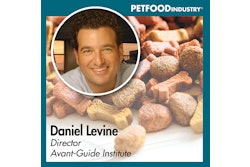
The gut microbiome plays a crucial role in various aspects of health, including digestion, immune function, inflammation, resistance to diseases and longevity. Just like humans can increase their wellbeing by taking care of their gut microbiome, so too can our furry companions.
The significance of research and study of the microbiome has the potential to transform nutrition and veterinary medicine, said Juan Gomez-Basauri, Ph.D., founder and president of Magellan.
“Microbiome research will have a significant impact on pet nutrition and veterinary medicine through several industry applications,” said Gomez-Basauri. “One such application is the formulation of pet foods that better support the health of the living gut and its microbial communities.”
Gomez-Basauri will speak about the pet microbiome and its future during his session, Longevity, live long and prosper, the fountain of youth and the microbiome, this year's Petfood Forum in Kansas City
Understanding a pet’s microbiome can lead to personalized nutrition and veterinary care. The potential to develop foods and diets that provide a diverse yet balanced gut microbiome for better wellbeing is enormous, said Gomez-Basauri.
“By using targeted ingredients and fiber components, we could selectively promote the growth of specific phyla and genus of microorganisms such as Faecalibacterium, Bifidobacteria, Lactobacilli, and by doing so, achieve improved digestion and nutrient absorption,” he explained.
“Pet-sonalized” nutrition to prevent, manage disease
Gomez-Basauri said using microbiome analysis as a diagnostic tool could help develop “pet-sonalized” nutrition plans by including specific probiotics and prebiotics, as well as dietary strategies tailored to the microbial community of an individual pet. The goal would be to prevent and manage conditions such as obesity, diabetes, inflammatory bowel disease, allergies and more.
“Microbiome-tailored nutrition can help support healthy immune function by promoting the growth of beneficial bacteria that interact with the immune system and enhancing its response to pathogens,” said Gomez-Basauri. “A diverse microbiome can help reduce the risk of digestive disorders as well as reduce food allergies and sensitivities. Furthermore, the health of the skin and coat is associated with the relationship between the gut microbiome and the immune system.”
Gomez-Basauri noted there are other benefits associated with maintaining a healthy microbiome, including weight management and increased life span. “Suffice to say that targeted nutritional microbiome interventions for improving health conditions and preventive care strategies will ultimately lead to better health outcomes and increased wellbeing of pets," he added.
Future developments and opportunities in the pet gut microbiota
Gomez-Basauri said current research will begin unraveling a new frontier in pet nutritional care. In-depth study of the gut microbiota will help in the development of probiotics and/or fibers specifically designed to support canine and feline health.
There are several opportunities that research of the microbiome presents, from the selection and evaluation of current and traditional ingredients to the use of novel and non-traditional ingredients, including alternative proteins, non-digestible fiber sources, resistant starches, probiotics and postbiotics, such as short-chain fatty acids (SCFAs), polyphenols and bacteriocins with the aim to promote a diverse and balanced gut microbiome for improved companion animal wellbeing.
“Microbiome research will enable scientists to understand the intricate relationship between diet, gut microbiota and health,” he explained. “This knowledge will allow for what I call ‘precision nutrition strategies,’ which are tailored to the unique needs of individual pets in order to optimize their health and wellbeing.”
Gomez-Basauri said as microbiome research continues to advance, collaborative efforts and pooling of expertise among scientists, veterinarians, pet food manufacturers and other stakeholders will usher in an era for personalized medicine, where nutritional strategies are tailored to the individual microbiome of each patient, ultimately benefiting companion animals and humans as well.
Juan Gomez-Basauri, Ph.D., is the founder and president of Magellan, a company dedicated to developing new products, commercializing scientifically validated ingredients, exploring new technologies, discoveries and innovation, and consulting services in the food and agriculture industries. His session, Longevity, live long and prosper, the fountain of youth and the microbiome, will take place on Tuesday, April 30, during Petfood Forum in Kansas City. For more information, visit petfoodforumevents.com.


















